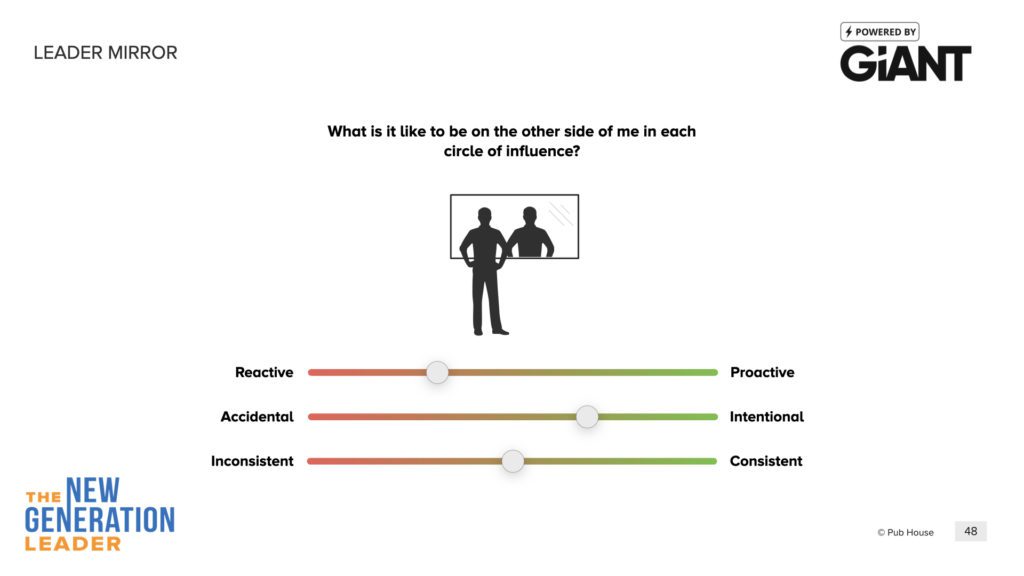
The culture you build will leave a trail of artifacts, either positive or negative, which have an impact on performance and the bottom line.
So what kind of artifacts does your team leave in its tracks?
Leaders define culture, so the opportunity to increase team performance is in your hands. Let’s dive into our conversation today with Tim Perseo, a New Jersey-based consultant focused on building high-performing, flourishing teams focused on Purpose, Personal Growth and Positive Relationships.
Shibumi Shade
The self-proclaimed (and Aaron-affirmed) “World’s Best Beach Shade.” Wind-powered, lightweight, easy to set up, and provides shade for everyone. Designed and sewn in America!

WorkLife With Adam Grant: The Science of Productive Conflict
Discover Your Voice
Everyone Speaks. Not Everyone is Heard.
You have a leadership voice. Discover it today.
What are the artifacts of your culture?
Tim Perseo
Support-Challenge Matrix

Leader Mirror

Full Episode 13 Transcript
The culture you build will leave a trail of artifacts, either positive or negative, which have an impact on performance and your bottom line. So what kind of artifacts does your team leave in its tracks? Leaders define culture. So the opportunity to increase team performance is in your hands. Let’s dive into today’s conversation with Tim Perseo. Welcome to The New Generation Leader, Episode 13: Leaders Define Culture.
Welcome to The New Generation Leader. We’re giving you the tools you need to lead in the digital world. Ready to reach your true potential? Let’s get started. Welcome to The New Generation Leader Podcast.
Aaron: Alright Tim, welcome to the show today. Glad to have you. Looking forward to our conversation. Tell us a little about yourself: where you are, what you do, who you serve.
Tim: I’m Tim Perseo. I am a GiANT consultant based in New Jersey. I serve mainly non-profits and healthcare companies. I have been with GiANT for about 2. 5 years now and have really enjoyed the transformation that it’s created in my life and hope to help people create high performing, flourishing teams.
Aaron: Awesome. And The 5 Voices is one of the tools that we use as a foundational tool. If you’re listening and you haven’t taken The 5 Voices, you can take that assessment. We’ll put the link in the show notes. Tim, what’s your voice order?
Tim: So my voice order is Connector / Creative / Nurturer. I used to wonder why people wouldn’t seem to get my ideas or understand what I’m trying to say. And then when I realized I was a Connector / Creative, I realized, you know, I can actually either 1. Sow my ideas more passionately or 2. When it comes back with criticism, when someone else comes back in with criticism or critique of my idea to know that it’s not about me, it’s actually about some things that are going to work in this idea. So I’ve learned to be a little more gracious in incorporating feedback. So there’s a little plug for The 5 Voices, it is really transformational and I would encourage you to take it.
Aaron: Yeah, it’s been really interesting in working with individual leaders like you said. It gives us something to continue that learning process, to develop some self-awareness about ourselves, but it’s also been transformational in relationships. Family relationships, my kids starting to understand their voice orders, my wife and I how we interact with our kids and also with the people we work with. Family members, in non profits, in serving the community. It’s a great, great tool that opens up lots of doors not only for the self-awareness but also the others’ awareness of how we collaborate more effectively.
Tim: Yeah. Know yourself to lead yourself and then know others to lead others.
Aaron: Yeah. Fantastic. All right Tim so one of the phrases we throw around a lot is “Leaders define culture.” When you hear “leaders define culture,” what comes to mind?
Tim: Well, the first thing that comes to mind is one of our foundational tools which is called the Support Challenge Matrix. So you can think about two lines dividing into four quadrants and the two lines are Support and Challenge. We want to be liberating leaders, we want to create a liberating culture. So we want to create high support and high challenge for everyone we’re leading, but that doesn’t come naturally to anybody. So, some people are really good with support but not really good at challenge. So they tend to be protectors and create a protector culture where there’s maybe mistrust or entitlement, maybe critique or resentment that will explode all at once at some some point. And that creates mistrust. Like can I really trust that the leader says it’s okay because you know, they just blew up last Thursday about this – this one thing that’s been going on for a while. That’s over in the protector quadrant, that’s where I fall a lot of the time. I’ll get to that maybe a little bit later in a later time. But then the other quadrant is high challenge and low support and that’s a dominating culture. That creates a lot of fear and manipulation. People don’t do things because they want to, they’re more afraid of what’s gonna happen if they don’t. And you know, that’s not really healthy either. It’s really, both protector cultures and dominator cultures are toxic cultures. And then you’ve got an Advocator who would provide neither support nor challenge. Usually this is when you have someone who’s burnt out and that’s you know, a culture of apathy and low expectation and nothing gets done. Obviously there’s no growth at all. So it’s about calibrating high support and high challenge. And when we look at our culture, do we find domination or people are afraid? Is there a lot of manipulation happening? Is their mistrust of the leader? Do people not say what they really mean? Or, do they feel entitled? Is there not much happening on that front? Or are people just burnt out and kind of just don’t care, you know? And then we can take that and look at the leader, whether that’s yourself or someone else, and use it as a self awareness tool. So that’s what I usually think of when I think of how leaders defined culture.
Aaron: Yeah, that’s really interesting to hear you talk about the Support Challenge Matrix because it’s always interesting hearing someone else described from their own perspective. And so you said, you would find yourself in the Protect Quadrant and we’ll drop a picture of this tool in the Show Notes. I naturally reside in the Dominate Quadrant as a Pioneer, that’s where I’m coming from. There’s always a level of expectation that it could be better. And so I’m naturally going to push and try to raise the bar. And so I love hearing about that from a different perspective. And what’s interesting is, as I look back through teams I’ve worked with, organizations I’ve worked with, teams I’ve worked in, I’ve been around all of these kinds of teams and organizations and cultures. And so what would you say is the leader’s first step to understanding how they can define a non-toxic culture?
Tim: First of all, you need to know your yourself and your own tendencies. So, again, something like The 5 Voices Assessment, is great. Or just looking at what you tend to do in terms of support and challenge. Are you more on the “ra-ra”, you know, get everybody excited, give them appreciation, encouragement? Or are you more of the setting expectations? You know, adhering to the rules, making sure people adhere to the rules? Those are just examples of different support-challenge behaviors. So, when when you can understand which you tend to do more of, you can figure out what the, you can almost plot yourself towards support and challenge and then you can figure out what we need to go. So, for myself as a Protector, I need to remind myself to constantly be giving more challenge in different scenarios. And, Aaron, you as a Dominator, I would imagine are going to need to give more and more support. And, you’re laughing. Did you want to do something about that? Since I called you on that on the carpet?
Aaron: Hey, that is absolutely the truth. We just celebrated our 13th wedding anniversary and my wife will call me on this on the spot that I’m not being very nurturing in certain moments, either with her or with the kids and that reminder from, from myself or from somebody else, like you said, plotting yourself and simply having that reminder: whether that’s somebody else giving it to you or an internal reminder of how we, as you’ve talked about, know yourself to lead yourself. If we know ourselves better, we can lead ourselves from a more healthy posture and to lead ourselves into that healthier place also allows us to lead others to a healthier place.
Tim: Yeah, absolutely. So, just figuring out which… almost like two levers: like which lever do you need to boost a little bit more in different situations? And then another great thing to tangibly do, is to ask people one-on-one or just in an appropriate environment, however, whatever your relationship is like with that person. Maybe your direct reports, and say, “Hey, what does support and challenge look like to you? What are the things that I do for you that look like support? What are some things that look like challenge to you? And what can I do better in those areas?” I might be encouraging someone in a specific way, but they don’t need encouragement, they just need more clear direction from me and that’s support to them. So support and challenge looks different for different people and you want to get really specific about the people on your team, or in your organization if you’re at the top of an organization, to figure out what it looks like to be a liberating culture for them. And this is gonna differ from person to person, team to team, organization to organization and really industry the industry too, because some industries are high challenge, so they need high support from their leaders.
Aaron: Yeah, that’s such a hard, challenging environment to be in… to have an established culture, that even like you just said is almost industry-wide and, depending on the industry can go either protect or dominate. But to have that be so commonly accepted, almost makes it more difficult to overcome and to change the narrative and to change the culture because we become just so accustomed to how it’s always been done.
Tim: Yes. Yeah. This is kind of cyclical in that way in that the culture around us or the industry around us, can sort of create different types of leaders as well. And then those leaders sort of reinforce that culture. So you know, just look at the look at the results. You know, you can see the culture by what it’s creating. It’s creating people who are burnt out, exhausted and, you know, afraid and feeling manipulated then okay, that’s a symptom of the culture. You can call it like artifacts – things that you can look at tangibly and you can dig a little deeper and figure out where they’re coming from. If you’re, you know, you’re not getting anywhere, people are, you know, protecting themselves all the time, you probably have a protector culture and you look at that and you dig underneath and figure out what sort of patterns or behaviors that are underneath that. And then, you know, it’s all about as a leader: What would a high performing and flourishing culture look like for your people? And what direction do you want to move from there?
Aaron: That’s great. I love that word, the artifacts. And I was just having a conversation this morning with a client that we’ve been working with and when we first talked to the the business leaders, 6-8 months ago, I quoted one of the Gallup Studies that we often talk about related to a turnover being detrimental. And so, when, as we’ve talked about today, the culture becomes toxic, those artifacts become part of our everyday system and environment. And so we end up having turnover which costs us money because we have to train more people and keep back-filling, we have lost productivity when those seats are empty, then eventually we get somebody new on board but we have to get them up to speed. So we threw that out 6-8 months ago to this team and said: So this is what could happen, but it’s not your reality. Well, just within the last few weeks, an entire division of their company resigned. Every team member in an entire division. And and I think it’s now one of those artifacts that they need to work through, they need to think about. And, sometimes it takes, just like we talked about with all of our tools, our tools are a mirror; let me show you this and what do you see about yourself in the mirror? But in saying that, there’s, very specifically, one tool that is actually a picture of a mirror. Can you talk a little bit about The Leader Mirror? That’s one of my all-time favorite tools to use and talk about.
Tim:Yeah, we like to say that ‘we all have broccoli in your teeth.’ And, you can imagine, just being at a dinner party with a big spear of broccoli in your teeth, and if someone, you know at the end of the night, finally points that out to you, you’re thinking like: Oh my gosh! How long has that been there? Well, the same thing with our tendencies. We all have them and we’ve been walking around our whole life with them. Or maybe just most of our life with them and we’ve developed them at some point in our life. But, The Leader Mirror is really choosing to look in the mirror, whether someone gives you some sort of feedback or, you’re looking at your organization and looking at the behaviors in your organization, and you’re choosing to look at the broccoli in your teeth and you have an opportunity to do something about that. So, you know, a few specific things is, whether you’re proactive or reactive. So whether you’re going to actually go ahead and and plan and be the person acting or you’re going to just be more passive and react to everything. Whether you’re going to be accidental or intentional. So, whether you’re gonna actually look at the reality that you have, that you’re in and you’re going to make plans and, you know, be aware of yourself and others. Or, you’re just going to show up and hope for the best all the time. And then the third one is consistency or being inconsistent. So it’s not enough to just be intentional with just your team and then you come home and then your accidental all the time or be intentional in your community outreach and all of that, but then you are really accidental with yourself and your your mental health, personal health, whatever. You have to be consistent across all of those areas. I’m choosing to look in the mirror and seeing where am I in terms of being intentional? Where am I in terms of being consistent? Where am I in terms of being intentional consistent? And the third one, what am I missing? Proactive? There you go. Thank you. Yeah, there you go. That’s what it’s like to look in The Leader Mirror.
Aaron: That’s awesome. That’s one tool that was, it was really the first tool that I learned in leadership from one of my first supervisors before GiANT was even GiANT or the tools were tools, he asked us that question of: What’s it like to be on the other side of you and answering those questions? And I think as leaders, when we have these conversations in the workplace, I hear from clients, from professionals, from participants and 5 Voices Workshops all the time: ‘Well, I’m this way at work and I’m this way at home, so which way truly am I?’ And, in some ways, we’re probably trying to be someone, we’re not in one of those environments. Because we are truly, our 5 Voices will help us understand ourselves, our wiring, our tendencies across the board, anywhere. Depending on industries, they may push us into activity that’s not in our wheelhouse or our comfort zone, but it’s important for us to really understand ourselves, our own tendencies, and to look in the mirror at work, at home, in the community, with family, with friends, no matter where we are, that we are always intentional, bringing our best, proactive. So that’s awesome. All right Tim, last, final question today: What’s the most impactful resource – book, podcast – what’s been on your mind lately that you’ve been telling everybody else about?
Tim: I’m a Connector so this is supposed to be easy for me.
Aaroon: All right. So, so while you’re thinking, let me give my two. We just got back from a week at the beach and my number one that I’ve been referring so many people to is the Shibumi Shade. It’s a compact tent that you unfold the polls and has a canopy that blows in the breeze. And so you tie off the pole, and the breeze does the work, which means we’ve lost a lot of tents on the beach – either to rust or the wind picks them up, blows them away and they come crashing down and you can’t use them again. But the Shibumi is seriously my happy place wherever I put that thing up. And so you just set that up and face the beach and I’m in my happy place when I’m under the Shibumi. I’ll put a picture in the Show Notes so you can see it. The other one is Malcolm Gladwell’s podcast. It’s so fascinating. Obviously Malcolm Gladwell is phenomenal. I love all of his work, but I’ll link to Revisionist History.
Tim: I love that podcast as well, and I listen to the one that you’re talking about Collecting Government and that’s a great podcast that does kind of touch on this idea of leaders and their tendencies and behaviors and how that defines the team and culture as well. So I will second that. So, since we’re doing, you know, recommendations about things that aren’t necessarily leadership, the one thing that has just like got me really excited this whole, you know, last seven months, my brother got me a pair of Air Pod Pros (which is what I’m wearing currently) for Christmas and it’s been like one of the best things that I’ve gotten. For one thing, I love taking walks because, you know, I love just being able to think and reflect and having these around while I’m doing that enables me to number one, listen to things that kind of feed my intellectual side but then also just like be able to like take notes and stuff just by talking to Siri and all that. So, just a good pair of wireless earbuds. And then, in terms of what to listen to, you mentioned Malcolm Gladwell but also another thinker that I really like is Adam Grant and he has a podcast called Work Life. He talks a lot about work culture – that’s part of it. He’s an Organizational Psychologist so he talks about the real brainy stuff behind what we talk about here. A particular podcast that he had recently on a recent season was about conflict and how to create a culture that resolves conflict. And, you know, he starts with interpersonal one on one and then he talks about how to scale that up to an entire organization. And that one was really eye opening for me as well as someone who likes to avoid conflict quite often.
Aaron: That’s awesome. I just read one of his books, I hadn’t read anything by him, but I just read Think Again and there was lots in there, like you said, the organizational psychology behind what we talk about and how we are leading teams to be more efficient, more effective to handle conflict, interesting. He had a whole section in there. I was just talking to somebody about how we approach rethinking – circling back around to the Support Challenge Matrix, our openness and willingness to recognize that maybe we are wrong or misguided or off point. Our openness, our willingness to approach something, to reconsider, re-think our posture and our perspective opens the door that is truly the psychological safety as Google found in Project Aristotle that creates an environment where people thrive. So lots of great stuff there, we’ll link to all those episodes and books in the show notes as well. Tim, thanks so much for your time. Thanks for spending some time on The New Generation Leader today and we’ll look forward to having you back soon.
Tim: Thanks Aaron. Glad to be here.
Thanks for listening to The New Generation Leader Podcast. Subscribe today on your favorite podcasting platform. Ready to reach your true potential? Join our network of like minded leaders in The New Generation Leader Mastermind Group. Find all the tools you need at newgenerationleader.com. Thanks for listening today, and we look forward to seeing you next time on The New Generation Leader Podcast.

